The education system, medical dreams, and learning difficulties often create a challenging trifecta for students with unique learning needs. For many, the rigid structure of traditional schooling fails to accommodate diverse learning styles, leaving some students feeling unsupported and disadvantaged. This article delves into the systemic shortcomings that hinder students with learning difficulties while offering actionable advice to help them persist in their pursuit of becoming doctors.

Challenges Within the Education System
Students with learning difficulties, such as dyslexia, ADHD, or processing disorders, often encounter significant barriers in traditional K-12 education. These systems prioritize standardized testing and uniform teaching methods, which can overlook individual learning needs. As a result, these students may struggle academically, leading to frustration and a loss of confidence in their abilities.
For example, schools often lack adequate resources, such as specialized teachers or tailored learning programs. According to the Wikipedia page on Special Education, many institutions globally face funding shortages, limiting their ability to provide essential support for students with learning difficulties. Additionally, societal stigma surrounding learning disabilities can exacerbate feelings of isolation, making it difficult for students to advocate for themselves.
Maintaining the Dream: Pursuing a Medical Career
Despite these challenges, many students with learning difficulties aspire to become doctors, driven by a passion for helping others. However, the road to a medical career is demanding, requiring resilience, strategic planning, and support systems. Here are some strategies to stay on track:
- Seek Accommodations: Many educational institutions offer accommodations, such as extra time on exams or alternative assessment methods. These adjustments can level the playing field, allowing students to demonstrate their true potential.
- Leverage Assistive Technology: Tools like text-to-speech software, organizational apps, and specialized learning platforms can make studying more accessible and effective.
- Build a Support Network: Surrounding oneself with supportive family, friends, mentors, and counselors can provide encouragement and practical guidance.
- Develop Strong Study Habits: Creating a structured study plan, breaking tasks into smaller steps, and focusing on strengths can help overcome academic hurdles.
By incorporating these strategies, students with learning difficulties can build the resilience needed to navigate the demanding path toward a medical career.

Transforming the Education System for Inclusivity
While individual strategies are essential, systemic change is equally important. Educational institutions need to adopt more inclusive practices to ensure that all students, regardless of their learning abilities, can thrive. This includes:
- Investing in teacher training programs to recognize and support diverse learning needs.
- Incorporating personalized learning plans tailored to individual strengths and weaknesses.
- Increasing funding for special education resources, tools, and staff.
- Fostering an inclusive culture that normalizes learning differences and reduces stigma.
For further insights on how inclusive education benefits society, the Britannica article on Inclusive Education provides detailed information on its impact and implementation.
Overcoming Mental Hurdles
The journey toward becoming a doctor with learning difficulties is as much a mental challenge as it is an academic one. Students may face self-doubt, societal stereotypes, and the fear of failure. However, maintaining a growth mindset can make a significant difference. Instead of viewing challenges as insurmountable, they can be seen as opportunities to develop persistence and problem-solving skills.
Additionally, celebrating small victories along the way can boost confidence and motivation. Whether it’s acing a test or mastering a complex medical concept, these milestones serve as reminders of progress and capability.
In conclusion, while the education system presents undeniable challenges for students with learning difficulties, these obstacles are not insurmountable. By leveraging available resources, adopting effective strategies, and advocating for systemic change, aspiring doctors can achieve their medical dreams and inspire others to do the same.
Readability guidance: This article uses short paragraphs, practical lists, and a balance of active voice and transition words to ensure clarity and engagement. Recommended strategies are actionable and supported by credible sources.


